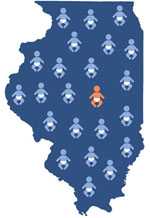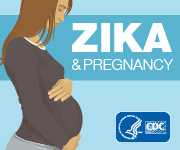Birth Defects Tracking in Illinois
Illinois Adverse Pregnancy Outcomes Reporting System

1 in 23 babies born in Illinois has a major birth defect.
The Illinois Adverse Pregnancy Outcomes Reporting System (APORS) is essential for understanding the impact of birth defects in the state. The program tracks babies born with a birth defect in Illinois, collects data to learn about factors that increase the risk for these conditions and to look at trends over time, and refers affected families to appropriate health services in Illinois.
Common. Costly. Critical.
- Each day, 415 Illinois families welcome a new baby. Most are born healthy, but about 30 of these babies will not be so fortunate. About 19 of these babies are born with a birth defect, 6 are born much too soon, and 3 of those born will die before their first birthday.
- Birth defects are costly – hospital costs for the treatment of birth defects are more than $2.5 billion each year in the United States.
- Babies born with a birth defect are more likely to die before their first birthday, compared to babies born without a birth defect.

About the Program
The APORS is a birth defects registry that looks for health problems among all babies who live in Illinois, which is important to get a complete picture of what is happening within the state. One of 14 birth defects tracking programs that receive a grant funded by CDC’s National Center on Birth Defects and Developmental Disabilities, the program monitors more than 150,000 births each year.
In the mid-1980s, the number of infant deaths in Illinois was very high, with 1 in 85 babies dying during their first year of life. The APORS program was established in 1986 to address this major public health concern.
The APORS works to:
- Track adverse pregnancy outcomes and provide services to affected families
- Refer babies and families to community health agencies to provide appropriate health services
- Collect data to monitor trends and respond to community concerns
- Publish reports to help state and local communities plan for future needs
- Document patterns of birth defects and other pregnancy outcomes in Illinois.
Program in Action
- Refers to services: A community health agency nurse offers parents a series of home visits, which continue until the child is two years old or no longer needs the case-management services. The nurse conducts physical and developmental assessments and assures that the parents obtain the services they and their babies need. The majority of families who qualify for these services accept them and report finding them reassuring and helpful. They appreciate having a local resource to contact about their babies.
- Promotes preconception health: The APORS program works with other state programs to emphasize the need for women to be healthy before becoming pregnant.
- Contributes to research: The APORS uses the data collected to participate in national studies that contribute to a better understanding of the patterns and causes of birth defects.
Making a Difference

The APORS services are having an impact on families in Illinois.
“Our nurse was so helpful and patient with me, especially with helping me with breastfeeding. I am a new mother of twins! Talk about stress! The nurse was so comforting in my time of need. She even brought me a breast pump, what a sweetheart! I couldn’t have gotten through this time without her. She even educated me on the WIC program; now I feel fully prepared to journey through motherhood knowing I am not alone because there are people out there who are willing to help. Thank you again for a great program!”
–an Illinois Mother
“My baby was very premature at birth. The public health nurse added that extra support. She was very supportive and knowledgeable about my baby’s diagnosis and needs. Keep up the good work!”
–an Illinois Parent
More Information
For more information on the Illinois Adverse Pregnancy Outcomes Reporting System, please visit their website, call (217) 785-1873, or email dph.apors@illinois.gov.
- Page last reviewed: June 12, 2017
- Page last updated: June 20, 2017
- Content source:



 ShareCompartir
ShareCompartir